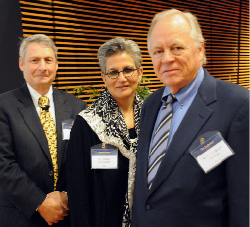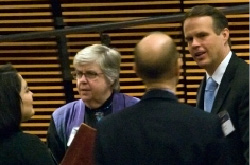Social, Organized and Psyched
A program at the center of its field convenes alumni from some of the world's major corporations and non-profits
Against that backdrop, “clearly, there is a need to educate the world about how organizations think, function and learn,” TC President Susan Fuhrman told listeners at the inaugural Social-Organizational Psychology Exchange in October. “And clearly TC belongs at the forefront of that effort.”
As Fuhrman noted, the College’s social-organizational psychology program boasts a diverse and influential alumni base. (Just a sampling: Riva Kantowitz, a consultant to the World Bank, the U.S. Department of State and the United Nations; Vera Vitels, Director of People Development at Time Warner; Dina Artzt, Senior Vice President of Investments at UBS Wealth Management; Marla Schaefer, former co-CEO of Claire’s Stores and currently a member of TC’s Board of Trustees; John Barkat, Assistant Secretary-General for the United Nations Ombudsman & Mediator Services; and Naif al-Mutawa, creator of the international comic series “The 99.”)
The Exchange, which will be held twice yearly, brought together some 150 faculty, students, alumni and friends of the program in October. The goal of the series, beyond professional networking, is to position the College as both a research and consulting resource center for organizations in New York City.
“We want to establish TC as an idea forum and intellectual center in this rapidly involving field,” said Debra Noumair, Associate Professor of Psychology and Education, who put together the event.
To that end, each Exchange will feature a guest lecture. At October’s event, William Pasmore, a new faculty member in the department who has consulted for Nabisco, United Airlines, the U.S. Navy, Hewlett Packard and other major corporations, spoke about “Trends in Organization Change.”
“Change is becoming more complex and critical, and for many organizations, failure in instituting change is simply not an option,” Pasmore said. Yet studies have found that only about one-third of corporate change efforts succeed, he said, and far fewer among these efforts create sustained impact or the capacity to implement change on an ongoing basis. Successful leaders need to build change from the “inside out,” Pasmore argued, rather than react to external events. To do that, they must also build support for change among all stakeholders in their organizations and create the capacity at all levels to learn from the way change plays out.
As Warner Burke, Edward Lee Thorndike Professor of Psychology and Education, outlined in his remarks, TC’s social org-psych program has been addressing issues of change from an increasingly wide range of perspectives since its founding in the early 1960s. The program’s roots were established by Morton Deutsch, now an emeritus professor and widely viewed as the father of the field of conflict resolution. Over the years, it has added executive leadership Ph.D. and certificate programs and two programs that serve faculty and students at the U.S. Military Academy at West Point. Today, program faculty specialize in organizational learning agility, organizational networks, leadership strategy, large group interventions, executive coaching, action learning, conflict resolution, adult development group dynamics and diversity.
Additional changes are now planned that will bring the program full circle with its past. In January, Pasmore will become editor of The Journal of Applied Behavioral Sciences (JABS), which was founded in 1965 under the editorship of TC psychology professor Goodwin Watson. The first issue included articles by several leading names in American psychology, including Carl Rogers and Chris Argyris.
Then as now, Burke said, the journal’s focus was on “how individuals and institutions change.”
Burke is also planning the creation, possibly as soon as next fall, of a Center for Group Dynamics. The name harks back to the legendary Center for Group Dynamics Research founded at MIT during the middle of the last century by Deutsch’s mentor, the psychologist Kurt Lewin. That center, together with the National Training Laboratories, which was then part of the National Education Association, co-sponsored the creation of JABS.
“Group dynamics have become an important focus in many areas of the College, so we see our center as a focal point for cross-disciplinary work,” Burke said.
Published Friday, Nov. 19, 2010


